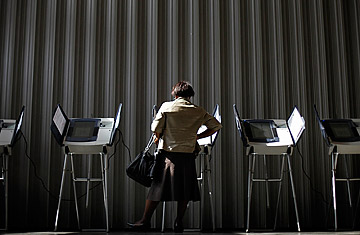
The Pew Research Center reports that many independent voters are expected to back Republicans in Tuesday's midterm elections
The same independent voters who swept Republicans from power in both 2006 and 2008 are expected to take a broom to dozens of congressional Democrats at the polls on Tuesday.
This dramatic swing of independent voters from left to right, notes Pew Research Center president Andrew Kohut, is perhaps the most significant force shaping American politics today. "This appears to be the third consecutive election that independents have voted against the powers that be," Kohut said on Monday afternoon. "These voters are very performance-oriented. Keeping them on your side is a challenge for the powers that be of both parties."
Tuesday's results are likely to add to other evidence that Americans are living in an unusually turbulent political era in which power rests uneasily in the hands of either party. If, as is widely expected, Republicans take control of the House of Representatives this week, it will be the first time in more than 60 years — since the mid-1940s — that more than 20 House seats net have changed party hands in three consecutive elections.
And it is the voters who don't identify with either party who are the most fickle. The Pew Research Center reported on Sunday that independents preferred Democratic candidates by 42% to 35% in 2006, the year the GOP lost 28 House seats. In a Pew survey conducted late last week, likely independent voters now favor GOP candidates by a wider margin, at 45% to 32%. That's a dramatic reversal of fortune for Democrats in two years' time.
In Pew's study, moreover, some 38% of Americans now identify as independents, an all-time high. "There are more of them," said Kohut, "and they are breaking for Republicans this year."
That bias was borne out by the results of the latest TIME/CNN/Opinion Research surveys, conducted last week in Colorado, Kentucky, California, Nevada and Pennsylvania. In surveys of more than 1,000 likely voters in each of the five states, independent voters favored the Republican candidates for Senate over their Democratic counterparts by large margins: from 49% to 41% in the California race to 63% to 26% in the Kentucky race. The trend has been holding in a variety of statewide contests from all regions of the U.S. since the TIME/CNN/Opinion Research polls of statewide races began in September.
But in this pendulum-driven environment, perhaps the only thing harder than winning the independent vote is keeping it, for the most pivotal group of voters in the country today are also the hardest to please. And if the winners in Tuesday's elections don't do a better job of addressing independents' concerns than the losers, they too are likely to be out on their heels in a few years' time. Noted Kohut: "Now the Republicans are going to enjoy some of that power and are going to take some of the heat."
